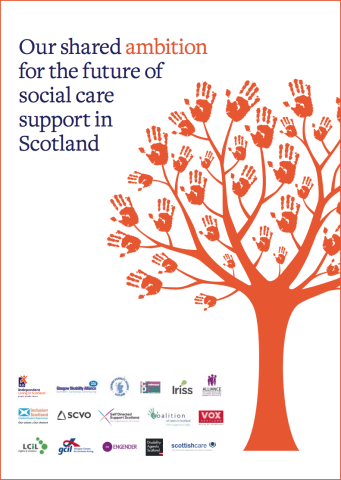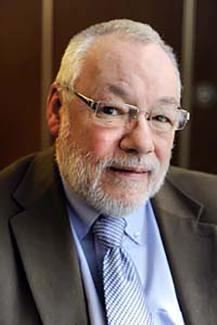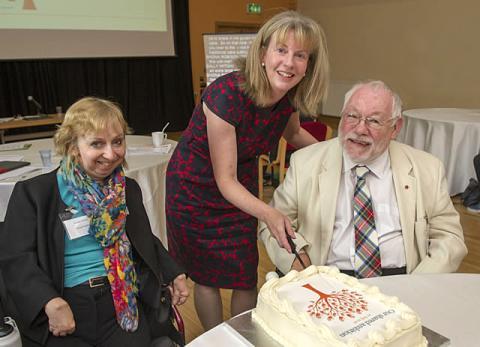Kerry Musselbrook from Iriss shares her thoughts on the Our Shared Ambition event which was held in September 2017.
Introduction
In July 2016, 'Our Shared Ambition for the future of social care support in Scotland’ was published. A year on, a question time style event was held in Norton Park in Edinburgh (Sept 2017) to ask what has moved on and what is holding us back?
But before addressing this, first and foremost, what is ‘Our Shared Ambition’ and why does it matter?
'People seek a life, not a service' it says.
For me, this is the key message that we must keep uppermost in this time of uncertainty and change. 'Social care and support must be positioned and organised as a means to achieving other ends.'
Iriss is a co-signatory of this visionary 11 page document, co-produced and signed by 16 organisations. However, it’s fair to say that the credit for initiating this goes to organisations representing disabled people, many with a proud record in the Disability Rights Movement. Disabled people are also at the sharp end of austerity and cuts, and their exclusion currently risks being compounded. Read Jim Elder Woodward’s blog for his take on this.
Having said this, Our Shared Ambition has application to all of us, disabled or not. It does not shy away from the bigger questions of our age, about what kind of Scotland we want to live in, what makes for a good life, and how together we pay for it, tackle inequalities and promote human rights.
But what is the vision – and what is it not?
While we all want improved health outcomes that prevent the need for healthcare and hospital stays, ‘Our Shared Ambition’ argues that we need to be careful not to reduce social care to healthcare in the community.
At the event, many people voiced fears that this is the direction we risk going in with an ‘over-focus’ on Free Personal Care (some disagreed); others argued that social care was getting lost or losing out to health in integration. Some cited savage cuts to self-directed-support (SDS) packages that basically confine disabled people to their homes, and disparities between bold and progressive policies and the reality on the ground as localities face the financial consequences of austerity. Jess Wade’s blog picks up on some of those themes, in relation to SDS specifically.
Our Shared Ambition argues that success has to ultimately be measured against the following six outcomes, universal and central to a good life and one worth living:
- Personal dignity
- Control by the individual over day-to-day life
- Participation in work, education, training, culture, civic life, or recreation
- Social and economic wellbeing
- Domestic, family and personal relationships
- An individual’s contribution to society
Making it happen?
At the July 2017 event, Jamie MacDougal (Deputy Director for Care, Support and Rights, part of the Directorate for Health and Social Care Integration within Scottish Government) asked ‘ What do we mean by social care as a society? What’s it for? His point was this, that as a nation, we don’t really know!
Perhaps, the key message is this: that this vision needs to be debated, kicked around, adapted and ‘owned’ and shared by others.
Indeed, Our Shared Ambition calls for just that — a major review of what social care is for and to widen the conversation that it has started. But for this to be achieved, we need real leadership and many champions. (It also argues that these ‘outcomes’ should be set in statute - which begs questions about what statutes we are talking about, especially post-BREXIT?)
In addition, Our Shared Ambition calls for a review of Scotland’s system of funding on the back of this. Panelists at the event shared some of their thoughts.
Speakers spoke about the need to prioritise preventative measures, and (political) difficulties in managing dis-investment in hospitals to deliver savings and shift resources from critical to preventative care.
On a different note, Sally Witcher, CEO of Inclusion Scotland, argued that we were used to being told that services were failing because they were inefficient. "Now, increasingly, we're told it's because we're not being creative enough. But maybe the time has come to accept that the real problem is that there just aren't enough resources in the system for it to be possible to deliver the services people need."
She continued, "we need to see social care support as an investment in people. " Investing in them — time, effort, pounds and pence- creates a return for everyone. So, it’s all about mutuality and reciprocity in the end.
Panel members also argued that this equally applies to creating more, and better paid jobs, in health and social care to meet rising demand and adequately reward increasingly complex jobs. That this is a sector, struggling with recruitment and retention, with some workers feeling under-valued, was stressed too!
And we shouldn’t forget to mention different ways of increasing taxes (and surely, tax avoidance) to support a fair and just infrastructure of care. Many panelists felt that this needed to be widely debated too.
But, ultimately I think, some people were suggesting that we need a different way of thinking about budgets and resources, so it's about how we spread, share and grow wealth by investing in people.
My personal reflections
This is universal
The Disability Rights Movement has long promoted the social model of disability, namely that: disability is caused by physical, cultural, organisational and attitudinal barriers within society which reduces the life chances and choices of an individual.
This ethos is central to Our Shared Ambition, with a focus on human rights.
I can’t help but also make the connection here to other excluded, marginalised or discriminated against groups. Much of this would equally apply to Gypsy Travellers, for example, but not on the basis of a recognised ‘disability.’ So, to go back to the start, I think it should be stressed that Our Shared Ambition has universal application — whether we are amongst the most marginalised, or whether we and those we love, need social car as we grow older or our circumstances shift and change across a lifespan.
It’s not just personal, it’s inter-relational
In social services we talk about achieving better personal outcomes for (and with) people and in health we talk about a person-centred ambition — so designing care around what’s important to or who and what matters most to people.
The job, however, is to make sure that this isn’t restricted to ‘the point of care’ provided by health or social service workers, and looks at people’s whole lives – their strengths, assets, and connections to family, friends and community. I wonder if this is more accurately described as people-powered, not person-centred – while not removing peoples’ rights around choice and control, which is central to emotional and physical wellbeing.
To quote the Centre for Confidence and Wellbeing…
Much of the well-being research stresses the importance of relationships and a sense of meaning, purpose and belonging. In this respect it is about the need to redress the individualism of our age. However, there is a difference between individualism and individuality. Individualism is primarily about self-interest whereas individuality is about being able to act authentically and to make decisions for ourselves. Research shows that being able to act autonomously is an important part of well-being.
Perhaps, for me, the outcomes missing from the six listed in Our Shared Ambition are the societal ones — around a more just and equitable society, a more caring and connected one, a more tolerant one, that accepts, optimises and celebrates diversity and difference? This is not a criticism of Our Shared Ambition — rather contemplation on my part, as to whether these will be added in subsequent steps in the journey.
Money?
If it’s true that we don’t yet have a shared a vision of what social care is for, how can we define what it is (or isn’t) and includes. In this scenario, I wonder how budgetary decisions will be made within the new 31 Integrated Authorities (IA) going forward? And what is ‘health’ (free at the point of care) and what is ‘social care’ (means tested) when these two things become more blurred and integrated? The other key question for me is, on what basis will this all be rationed, particularly (and unless) we are unable to grow and share our wealth?
So, to sum up, this is about money; but more importantly, it needs to be part of a wider debate about what kind of Scotland we want to live in. As those at Norton Park event stressed, ultimately this is about leadership, a will to address this — and of course, finding a process to help us get there.
For now, and as part of this process, let’s keep having these conversations … and taking these out to others. Only by showing some leadership ourselves (whoever and wherever we are) can we help shape and grow a vision for the future of social care and support. This needs to be one that all of Scotland can share!
Additional information
Panelists at the 14th September 2017 Norton Park event were: Charlie McMillan (Capability Scotland, and panel Chair), Sally Witcher (Inclusion Scotland), Karen Hedge (Scottish Care), Jamie MacDougall (Scottish Government), Lucy McTernan (SCVO), Neil Findlay (MSP), Beth Hall (COSLA).
The 16 co-signatories of Our Shared Ambition are: Independent Living in Scotland, Glasgow Disability Alliance, Learning Disability Alliance Scotland, CCPS, Iriss, the ALLIANCE, Inclusion Scotland, SCVO, Self Directed Support Scotland, Coalition of Carers in Scotland, VOX Scotland, LCiL, Glasgow Centre for Inclusive Living Engender, Disability Agenda Scotland, Scottish Care.
SaveSave
SaveSave




